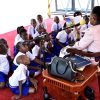Columnists
Leaders should take queue from Minister Todwong on empowerment
The challenge is principally of leadership
Recently, 000- Shs 400,000 and this money has done so much for these women as they have invested it productively.
The women groups have now multiplied the capital and profits of their initial small investments, and they are now employingyoung people as secretaries and accountants. The women are also building Mabati (iron-roofed) houses for each member of their group. This is how it happens: the women of a particular group move to the home of one member and contribute building materials and labour and involve in the actual building process of the house until the house is finished. After that they move to another member’s home and build a house, until the cycle is complete and all members have permanent houses.
Not only the mabati houses, but the women are also carrying out extensive farming where they are cultivating swathes of land on the black fertile soils and producing enough food and cash crops to export to Sudan, DR Congo, Kenya, and even areas like Kampala and other districts.
The people of Nwoya love their man Todwong so much because he is mobilising them out of poverty and into wealth and income creation.
I also met a group of young men who had arranged a thanksgiving ceremony for Todwongfor having taken then to Kampala. These youngsters were particularly happy with the minister that he had given them an opportunity to see Kampala for their very first time! Theseparticular group of young men wondered, on their way to and back from Kampala,why there are almost no mad and wattle houses in other areas outside Nwoya; they have now come back to lead a revolution against grass-thatched houses.
The youth of Nwoya are enthusiastic about the new developments taking place in Nwoya district. I didn’t see any lazy and idle youth but most of them were busy in their shambasand attending to their projects such as piggery and poultry.
I met a young man who told me that he owns over 3,500 acres of land, and his plan for the land was big. He plans to hire tractors to cultivate maize, beans, soya beans, chili,and plant one hundredthousand pinetrees and five hundred fruits trees such as mangoes, jackfruit, oranges, guavas, etc. He already has a large herd of 200 exotic cattle which supply milk and beef to South Sudan.
Having witnessed and experienced all the above, I kept asking myself why there is too much poverty in other parts of the county amidst plenty of resources including the people themselves who should do something for self-employment and wealth creation as is the case with the Nwoya people.
The challenge is principally of leadership. It’s true that our communities lack inspiring and foresighted leaders to mobilise the people and help them exploit the opportunities and resources at their disposal.The resultant effect of this kind of lackadaisical approach of the leaders towards people empowerment is the chronic beggary syndrome by the people. Each time people see their leaders the next thing they will ask for is money for school fees, food, sugar, salt, soap, paraffin,medical care and among other essential needs, which shouldn’t be the case.
ForTodwong’s case, his people flock his home not to ask for money, butmarket connections, value addition chains, high value planting and breeding material, warehousing receipts, etc. For quite some time they had been demanding for a commercial bank since they have been keeping their money in wooden and metallic safes as well as mattresses. An investor is already building a huge complex which shall house the bank.
If only leaders could pay a familiarization tour to Nwoya, and learn from the wonders of the women and youth who investing their energy into serious money-making!
bwengo@gmail.com
Comments













